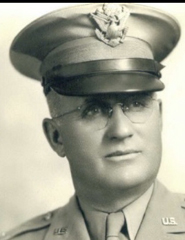IOWAN'S HEROIC WORK REVEALED
Corporal From Buffalo Center Gets Award
By FRANK MILES
(Iowa Daily Press Correspondent)
With the 5th Army in Italy (IDPA) -- An indication of Iowa's great contribution to the billed cause in World War II is provided in the Secretary of War Stimsons' announcement in The Stars and Stripes of 91,063 casualties in Italy to Oct. 16. On the basis on Iowa's claim to 2 percent of the nation's population, the state's share in casualties would be 1,819.
The 168th infantry, which started with 3,400 Iowans, now numbers a few more than 400 from the state. Some other regiments here were composed mostly of Iowans at the outset and Hawkeyes are in every other organization in the 5th army.
The War Secretary was quoted as saying total American casualties in the war to Oct. 16 were 472,779 in the army, navy, marine and coast guard. The number in Italy constitutes 19 3/4 per cent of that total.
Official records say that there are 6,000,000 Americans overseas. The writer knows nothing officially but would give any odds there are fewer than 1,200,000 Yankee troops in Italy. The leads me to believe casualties here, comparatively, have been much higher than in any other theater.
Fifth army headquarters has announced award of the bronze star for heroic achievement in action, in the 34th division to the following Iowans:
Staff Sgt. Eugene C. Tompkins, Archer; Tech. Sgt. James W. Palmer, Maquoketa; Cpl. Carl A. Kiewlet, Buffalo Center; Tech. Sgt. Donald N. Longcor, Maxwell; Pvt. Edwin R. Van Dolah, Dallas Center; 2nd Lt. Wallace W. Koether, Centerville; Pfc.Kenneth G. Gardner, Selma; Cpl. Raymond Iverson, Wallingford; Pfc. Harley E. Brand, Waterloo.
Tompkins, when his comrades took cover under heavy enemy barrage, remained in his place, anticipating a counter-attack, and when 4 nazis with machine guns approached within range, killed them with his rifle preventing emplacement.
Palmer worked tirelessly, performing his duties with high efficiency and showed remarkable calmness under fire.
Kiewiet, near Anzio, volunteered to haul a large anti-tank gun 300 yards forward with a jeep over a mined, cratered road under constant enemy fire. He completed his mission in which he once escaped being shot by a halting vehicle and remaining motionless when an enemy flare was sent up.
Longcor, when his machine gunner was killed, dashed across open ground to the gun, fired it effectively and accurately until he was threatened by an enemy tank, then moved to another position and continued his deadly work.
Van Dolah, as driver of a regimental message center vehicle, successfully accomplished every trip assigned to him, under most adverse combat conditions and frequently under heavy fire.
Koestner and a comrade learned ammunition was urgently needed by forward elements, appropriated a bracer of oxen and a cart. They removed their helmets and weapons, lowered their trousers over their boots, donned civilian coats, then walked boldly under fire over 2 miles of road unswept for mines in full view of the enemy to an ammunition dump, got a load and returned over the same route.
Gardner, when his patrol was pinned down by enemy machine gun and mortar fire and was unable to move, volunteered to seek assistance from his company. He stood in full view of the nazis, ran toward them, then crawled 1,000 yards under constant fire to his command post from where aid had already gone out.
Iverson, handling 18 litter squads for the evacuation of wounded soldiers over 6 miles of roadless, mountainous terrain, went forward with advancing troops, reconnoitered and found suitable trails and paths and supervised the squads ceaselessly for 3 days and 2 nights.
Brand, through painfully wounded by shrapnel, crawled 50 yards under fire to give first aid to a soldier he thought in worse condition than he.
Staff Sgt. Joseph E. Dennis, Cedar Falls, has been given a combat promotion to 2nd lieutenant by Lt. Gen. Mark Clark, 5th army commander. He came overseas in January of 1942.
Sgt. Edwin Brown, Des Moines, and Pvt. Raymond B. Williams, Bloomfield, and 2 comrades, each of the 4 from a battalion of the 168th infantry, operate what they call "The Strictly GI Radio Shop" in Italy, which is open day and night, often around the clock.
In everything from fox holes to wine cellars and under all kinds of combat conditions, the quartet has repaired radios for their regiment. They have dried out radios with blow torches, in fire places and ovens after river crossings and done countless other tasks in their line skillfully.
Source: Mason City Globe-Gazette, November 10, 1944
![]()

